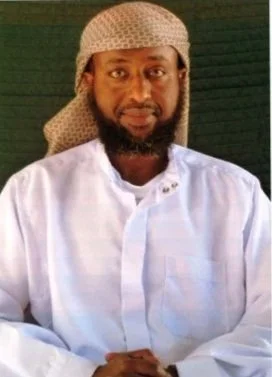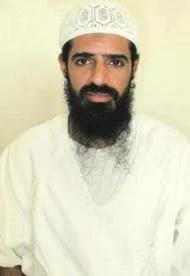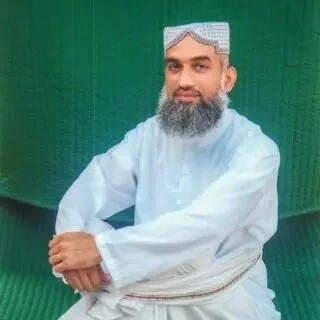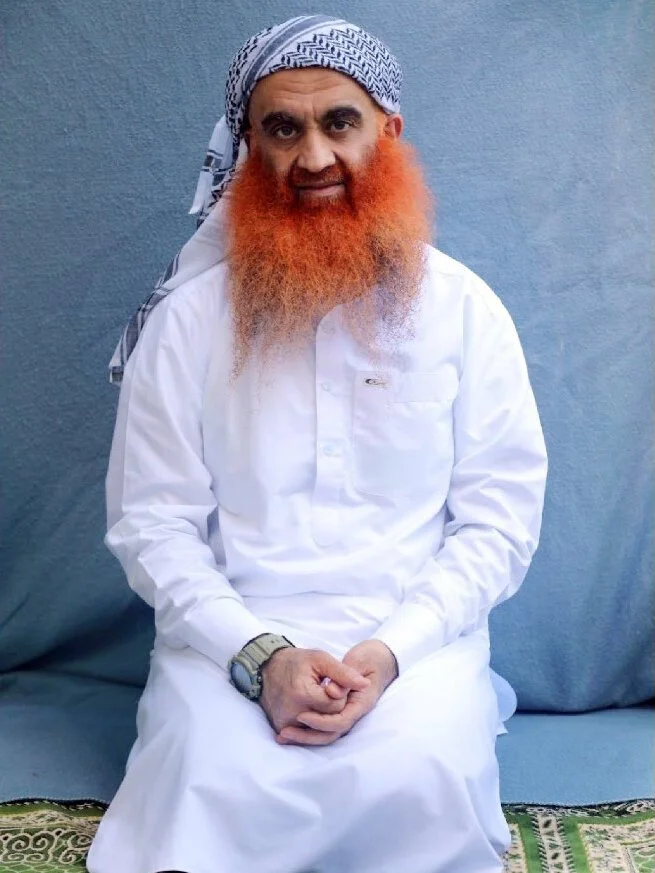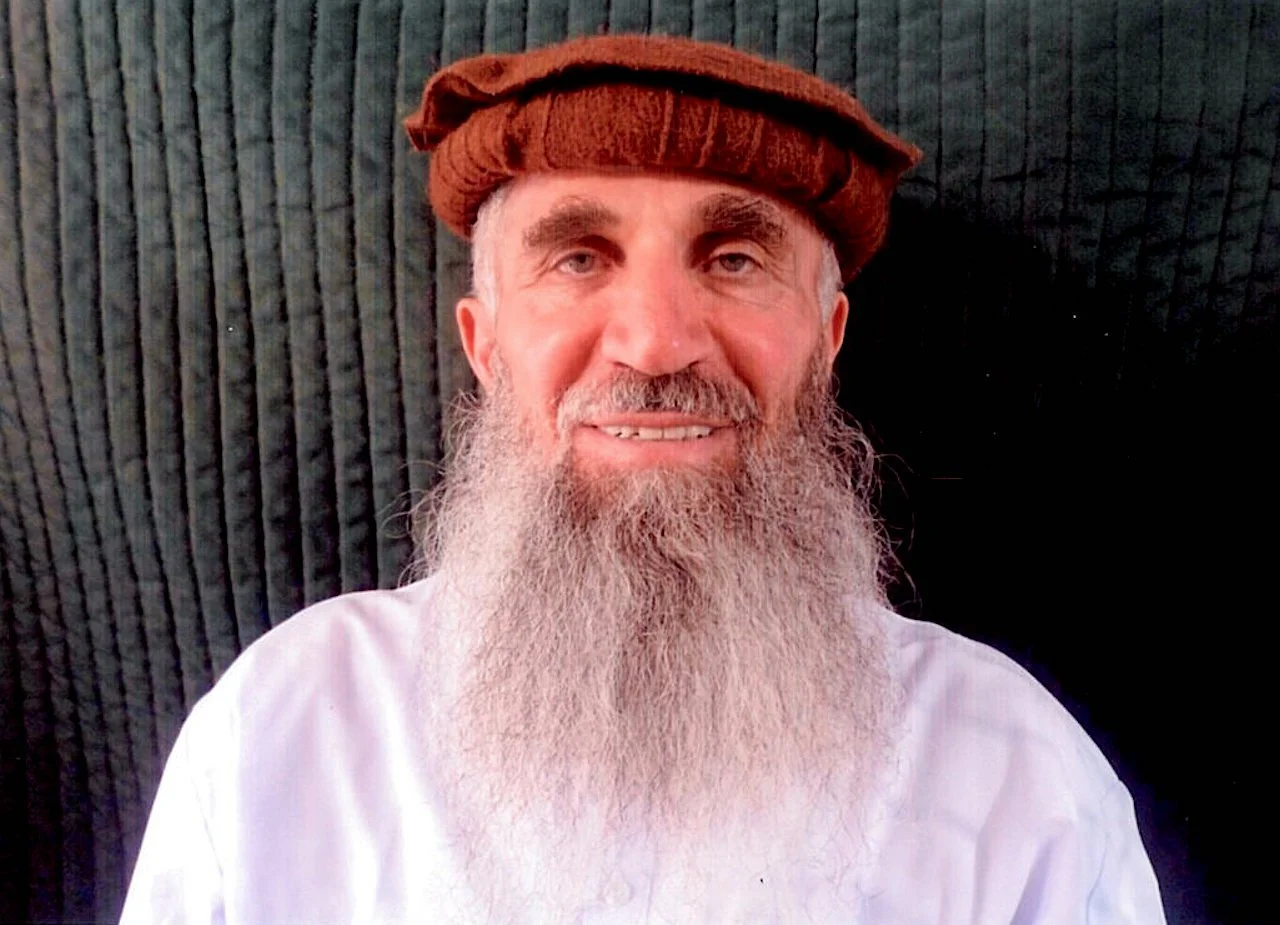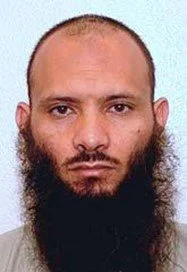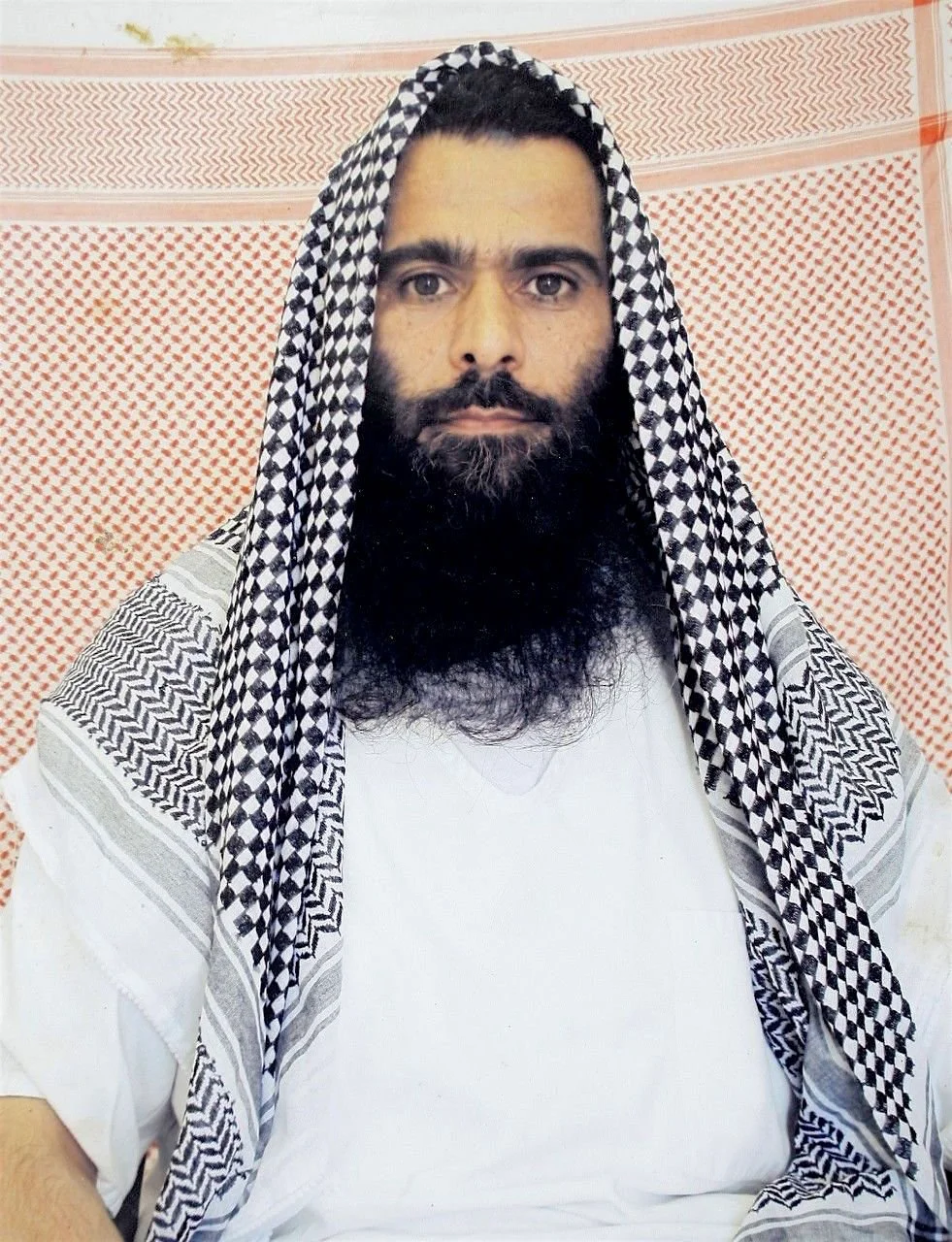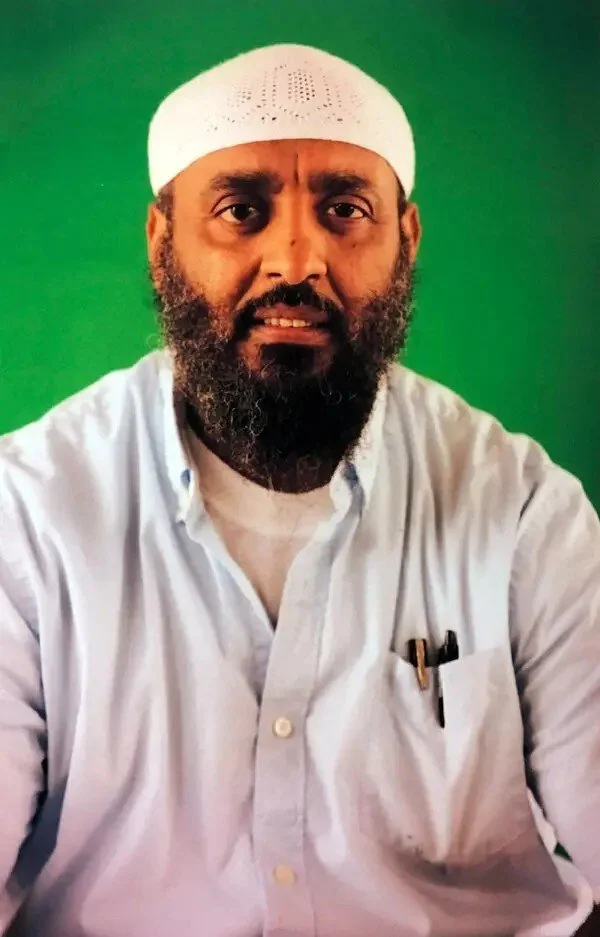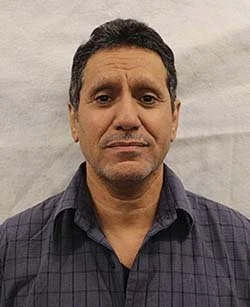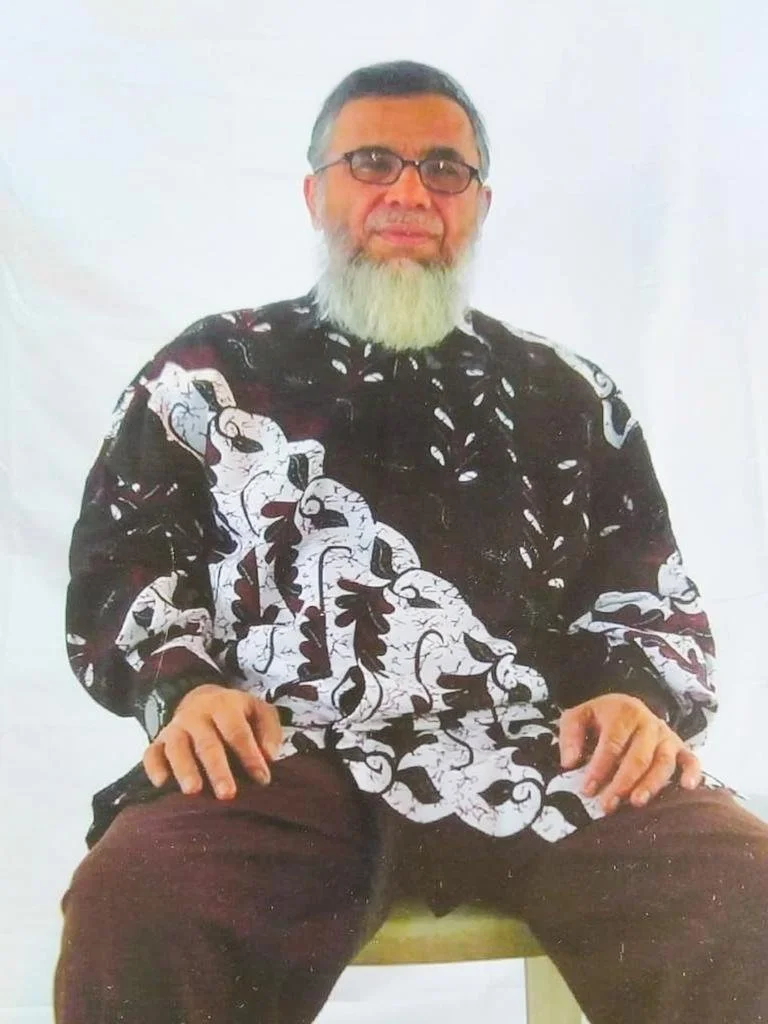Ismail Ali Faraj Ali Bakush
Born: Libya
Captured: May 2002, Lahore, Pakistan
Detained at Guantanamo: Since August 2002
Current Status: Approved for transfer (2016)
Ismail Ali Faraj Ali Bakush grew up in Libya during political instability. U.S. authorities allege that he was affiliated with the Libyan Islamic Fighting Group (LIFG) and connected to terrorist activities—claims Bakush has consistently denied, including accusations of being an explosives expert for Al-Qaeda.
Arrested in Pakistan in 2002, he was transferred to Guantánamo Bay the same year, where he has been held without charge or trial for over two decades. In 2005, Bakush filed a Habeas Corpus petition challenging his indefinite detention, but like many others, he faced prolonged legal delays. In 2016, the Periodic Review Board (PRB) cleared him for transfer to a third country, yet he remains imprisoned. Despite being approved for release nearly a decade ago, Bakush continues to live in legal limbo, trapped by a system that has denied him justice.
Zayn al-Abidin Muhammand Husayn
Born: Saudi Arabia
Captured: March 2002, Pakistan
Detained at Guantánamo: Since 2006
Current Status: Indefinite detention without charge
Zayn al-Abidin Muhammad Husayn, also known as Abu Zubaydah, was born in Saudi Arabia and is of Palestinian descent. He pursued higher education in India before travelling to Afghanistan in the early 1990s. In March 2002, he was captured in Pakistan and became the first detainee held within the CIA’s secret prison network.
Husayn was subjected to prolonged torture across several CIA "black sites," including nearly a year in Stare Kiejkuty, Poland. Despite extensive interrogation, U.S. intelligence later concluded that he was not a member of Al-Qaeda and had no connection to the September 11 attacks. In 2014, a lawsuit detailed his experiences of torture, inhumane treatment, and medical experimentation. Human rights experts have repeatedly called for his immediate release, citing his deteriorating health and the absence of formal charges. Despite these appeals, Husayn remains detained at Guantánamo Bay.
Muhammed Rahim
Born: Eastern Afghanistan
Captured: 2007, Pakistan
Detained at Guantánamo: Since 2007
Current Status: Indefinite detention without charge
Muhammed Rahim, an Afghan national from eastern Afghanistan, once worked for a government committee focused on eliminating opium poppy cultivation before being forced out by the Taliban. In 1979, he fled to Pakistan with his brother. Following the U.S. invasion of Afghanistan in 2001, Rahim briefly worked with Arab fighters, though he later described this as an attempt to survive in a struggling economy. Known locally as a peaceful teacher, community elders have vouched for his character, calling for his release.
In 2007, Rahim was captured in Pakistan and handed over to the CIA, where he endured torture before being transferred to Guantánamo Bay. The 2014 U.S. Senate report revealed the extent of his mistreatment, marking him as the last detainee to undergo the CIA’s torture program. Despite appearing before a parole board in 2016 and maintaining his innocence, Rahim remains imprisoned at Guantánamo without charge or trial. His family continues to advocate for his release from Kabul.
Ramzi Mohammed Abdullah bin al-Shibh
Born: Yemen
Captured: 2002, Pakistan
Detained at Guantánamo: Since 2006
Current Status: Declared unfit for trial (2023)
Ramzi bin al-Shibh was born in South Yemen and spent much of his youth in Sana’a, where he worked for the International Bank of Yemen. After being denied a U.S. visa in 1995, he sought asylum in Germany, living in Hamburg before returning to Yemen when his claim was rejected.
In 2002, he was captured in Pakistan and held in CIA black sites for three years, where he was subjected to severe torture, including sleep deprivation, physical abuse, electric shocks, and prolonged isolation. He was transferred to Guantánamo Bay in 2006, where he remains.
Despite being charged with conspiracy, his trial has faced years of delay. In 2023, a U.S. tribunal found him mentally unfit to stand trial, citing the long-term effects of torture and psychological deterioration.
Abdul Rahim Hussein Muhammed Abdu al-Nashiri
Born: Saudi Arabia
Captured: 2002, Dubai
Detained at Guantánamo: Since 2006
Current Status: Facing charges; pre-trial proceedings scheduled (May 2025)
Abdul Rahim al-Nashiri, a Saudi citizen, was captured in Dubai in 2002 and held in CIA secret prisons for four years before being transferred to Guantánamo Bay in 2006. During interrogation, he was subjected to torture, including waterboarding, sleep deprivation, confinement in small boxes, and threats involving a gun and power drill.
He was first charged under the military commission system in 2008, but those charges were later dropped and reinstated in 2011. In 2019, a U.S. court invalidated earlier rulings due to a judicial conflict of interest. In 2025, a military judge ruled that al-Nashiri’s confessions were obtained through torture and are therefore inadmissible. He remains in detention, with pre-trial proceedings scheduled for May 2025.
Encep Nurjaman
Born: Indonesia
Captured: 2003, Thailand
Detained at Guantánamo: Since 2006
Current Status: Charged, pre-trial hearing scheduled (March 2025)
Encep Nurjaman, or Hambali, is an Indonesian citizen born in a small village in West Java, the second of thirteen children in a farming family. He was captured in Thailand in 2003 and held for three years in CIA secret detention before being transferred to Guantánamo Bay in 2006.
During detention, he was subjected to enhanced interrogation techniques, including beatings, nudity, wall slamming, and isolation, often misunderstood due to language barriers. He later stated that his confessions were based on what he believed interrogators wanted to hear under torture.
Hambali remains detained at Guantánamo Bay, and in March 2025, he is scheduled for a pre-trial hearing related to his alleged role in the 2002 and 2003 bombings in Indonesia—charges he and his legal team deny.
Ali Hamza Ahmad Suliman al-Bahlul
Born: Yemen
Captured: 2001
Detained at Guantánamo: Since 2002
Current Status: Convicted, serving sentence
Ali Hamza al-Bahlul is a Yemeni citizen with limited publicly available information about his early life. He was one of the first detainees transferred to Guantánamo Bay after being captured in 2001.
In 2005, he appeared before a military commission and requested a Yemeni lawyer, which was denied. He later asked to represent himself, believing he would not receive a fair trial, but this was also refused. Although the U.S. Supreme Court later ruled the commissions illegal, new charges were brought in 2008, and al-Bahlul boycotted the proceedings.
In 2016, a Court of Appeal upheld his conviction, and the Supreme Court declined to review the case. He remains imprisoned at Guantánamo Bay, living in near-total isolation.
Guled Hassan Duran
Born: Mogadishu, Somalia
Captured: 2004, Djibouti
Detained at Guantanamo: Since September 2006
Current Status: Approved for transfer (January 2022)
Guled Hassan Duran, a Somali refugee who was granted asylum in Sweden, was captured by U.S. forces in 2004 while travelling to Sudan for medical treatment. He was held in CIA secret prisons for 900 days, where he endured mistreatment and was denied medical care before being transferred to Guantánamo in 2006.
Duran has never been charged with a crime. In 2022, the Periodic Review Board determined he was not a threat and approved him for transfer, yet he remains imprisoned. His health continues to deteriorate, and he was hospitalised in 2022, but legal restrictions prevent his transfer to the U.S. for treatment.
Muin al-Din Jamal al-Din al-Fadil Abd al-Sattar
Born: United Arab Emirates
Captured: December 2001, Pakistan
Detained at Guantánamo: Since 2002
Current Status: Approved for transfer (2010)
Muin al-Din Jamal al-Din al-Fadil Abd al-Sattar, also known as Omar al-Farouq, was born in the UAE, holds Pakistani citizenship, and is of Rohingya Burmese descent. After attending high school in Saudi Arabia, he became a religious teacher in Mecca before travelling to Afghanistan, where he lectured on Islam in villages near Kandahar and Kabul.
In 2001, Al-Sattar was captured in Pakistan and later transferred to Guantánamo Bay in 2002. U.S. authorities alleged links to al-Qaeda, though Al-Sattar has consistently denied membership. He was subjected to harsh interrogation methods, and some evidence used against him came from questionable sources, including testimonies obtained under torture.
Despite a 2008 assessment recommending continued detention, Al-Sattar was cleared for transfer in 2010—indicating either earlier intelligence flaws or that concerns had been resolved.
Mustafa Faraj Muhammad Masud al-Jadid al-Uzaybi
Born: Libya
Captured: 2005, Pakistan
Detained at Guantánamo: Since 2006
Current Status: Indefinite detention without charge
Mustafa Faraj Muhammad Masud al-Jadid al-Uzaybi, also known as Abu Faraj al-Libi, was born in Libya and had been living in Afghanistan since 2000. In 2005, he was captured in Pakistan and subsequently transferred to a CIA secret prison in Romania, where he was subjected to inhumane interrogation techniques for several months. Despite developing hearing loss and other health concerns during detention, interrogations continued until it was determined he was not withholding information.
In 2006, Al-Libi was transferred to Guantánamo Bay, where he remains without charge or trial. His prolonged detention without due process highlights the ongoing human rights concerns surrounding Guantánamo Bay and its detainees.
Mustafa Ahmed Adam al-Hawsawi
Born: Saudi Arabia
Captured: March 2003, Pakistan
Detained at Guantánamo: Since 2006
Current Status: Facing charges before a military commission
Mustafa al-Hawsawi is a Saudi national who was captured in Rawalpindi, Pakistan in 2003, alongside Khaled Sheikh Mohammed. He was held in CIA secret detention for over three years, during which he was subjected to torture, including forced rectal exams and waterboarding, leading to lasting medical conditions. To avoid court oversight, the CIA moved him between secret sites, including one in Lithuania, where local hospitals refused him treatment. In 2006, he was transferred to Guantánamo Bay, where he remains.
Al-Hawsawi was charged in 2008, but the case was dismissed in 2010. A 2024 plea deal to avoid the death penalty was revoked days later. He continues to face capital charges in a system widely criticised for violating international legal standards, despite no proven link to the September 11 attacks.
Walid Muhammad Salih bin Mubarak bin Attash
Born: Yemen
Captured: 2003, Pakistan
Detained at Guantánamo: Since 2006
Current Status: Charged, awaiting trial
Walid bin Attash was born in Yemen into a prominent Saudi family and raised in Saudi Arabia after his family was deported. He later studied at the University of Islamic Studies in Pakistan. In 2003, he was captured in Karachi by Pakistani authorities and held in CIA secret detention for over three years.
During this time, he was subjected to enhanced interrogation techniques, including slapping, walling, water dousing, and sleep deprivation, adjusted due to his prosthetic leg. Reports also describe the use of nudity and dietary manipulation.
In 2008, bin Attash was charged under the military commission system for alleged involvement in the 9/11 attacks. He remains at Guantánamo Bay, currently facing trial alongside four other detainees.
Ali Abdul Aziz Ali
Born: Kuwait
Captured: 2003, Pakistan
Detained at Guantánamo: Since 2006
Current Status: Charged, awaiting trial
Ali Abdul Aziz Ali, also known as Ammar al-Baluchi, is a Kuwaiti national and the nephew of Khalid Sheikh Mohammed. Born into a well-educated family, he grew up across Kuwait, Balochistan, Karachi, and Dubai, excelling in computer engineering and becoming multilingual.
He was captured in Pakistan in 2003 alongside several others and spent three years in CIA secret detention, where he was subjected to severe torture, including beatings, starvation, and sleep deprivation. Medical personnel were directly involved in monitoring and prolonging his suffering.
Transferred to Guantánamo Bay in 2006, Ali was charged in 2008 under the military commission system, but he has yet to receive a fair trial. He remains detained and has had no contact with his family in over 15 years, aside from letters.
Khalid Sheikh Mohammed
Born: Pakistan
Captured: 2003, Pakistan
Detained at Guantánamo: Since 2006
Current Status: Charged, facing military trial
Khalid Sheikh Mohammed is a Pakistani national captured in 2003 during a CIA–Pakistani intelligence raid. He was held in CIA secret detention for three and a half years, where he was subjected to severe torture, including nearly 200 waterboarding sessions, sleep deprivation, beatings, and stress positions.
In 2006, he was transferred to Guantánamo Bay, where he remains. He is charged with conspiracy in connection to the 9/11 attacks and is facing trial alongside four other detainees. His legal team has petitioned the UN to investigate his torture. In 2025, he offered to plead guilty in exchange for avoiding a death penalty trial, agreeing not to disclose classified details of his treatment.
Nashwan Abdulrazaq Abdulbaqi al-Tamir
Born: Mosul, Iraq
Captured: 2006, Turkey
Detained at Guantánamo: Since 2007
Current Status: Convicted; transfer to Iraq delayed pending court decision
Nashwan al-Tamir, also known as Abdul Hadi al-Iraqi, was born in Mosul and is fluent in Arabic, Urdu, Pashto, Kurdish, and Persian. He previously served in the Iraqi army and later travelled to Afghanistan to fight during the Soviet invasion.
Captured in Turkey in 2006, al-Tamir was held for over five months in CIA black sites before being transferred to Guantánamo Bay in 2007. He was one of the last detainees in the CIA secret detention program, though details of his treatment remain undisclosed.
He was charged in 2014 but faced repeated trial delays due to serious spinal health issues. In 2022, he was convicted by a military commission. In 2025, a transfer to Iraq was announced, but al-Tamir successfully challenged the move in U.S. courts, citing inadequate medical care. His transfer is currently on hold pending the outcome of his case.

